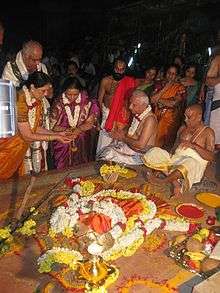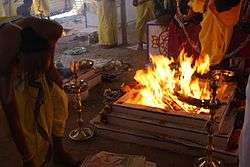Kumbhabhishekham
Kumbhabhishekham, also known as Samprokshanam is a Hindu temple ritual that is believed to homogenize, synergize and unite the mystic powers of the deity. It is part of the consecration ceremony of Hindu temples.[1] Kumbha means the Head and denotes the Shikhara or Crown of the Temple (usually in the gopuram) and abhisekham or prokshanam is ritual bathing. Kumbhabhishekham is widely celebrated as a festival in South India.

On the appointed day and at an auspicious time, the Kumbha is bathed with the charged and sanctified holy waters in the sacrificial pot and, by a mystic process, these pranic powers trickle down a silver wire and enter the deity installed inside the sanctum sanctorum of the temple. The deity, which was until then only a granite sculptured stone image, is believed to transform into a vibrant and vivid living representation of the deva with innate beatitude, grace and grandeur, conferring divine blessings on all devotees.
Ashtabandhanam

Ashta means 8 in Sanskrit and Bandhanam means tying or fixing. Ashtabandhanam is the process of affixing an icon to its pedestal (peetham) with a clay-like paste made of 8 specific herbs mixed with wood lac, limestone powder, resin, red ochre, beeswax and butter. The paste is formed into long rolls about 2 cm thick and applied directly around the base of the icon, so that the cemented joints become watertight. This process is believed to keep the icon rejuvenated for a period of 12 years. When the Bandhanam is performed with gold (Swarnabandhanam), the rejuvenating power of the deity is believed to last for a period of 100 years.
The '''Ashtabandhanam' paste is pliable like rubber. Through repeated interactions with abhishekha dravyams - materials used to bathe the icon during daily worship like water, milk, buttermilk, sandal paste and oils - and atmospheric oxidants, the paste loses its flexibility, becomes rigid and gets riddled with a lot of fissures. Through these fissures, the abhisheka dravyams percolate and attack the Yantra embedded under the peetham, obliterating the Bijaksharamantras -- mantras of sacred syllables (bija) -- that are inscribed on the Yantra, and this is believed to contribute to the lowering of the pranic spiritual power of the deity with the passage of time.
References
- "Consecration: Kumbhabhishekam | The Pluralism Project". pluralism.org. Retrieved 10 January 2020.